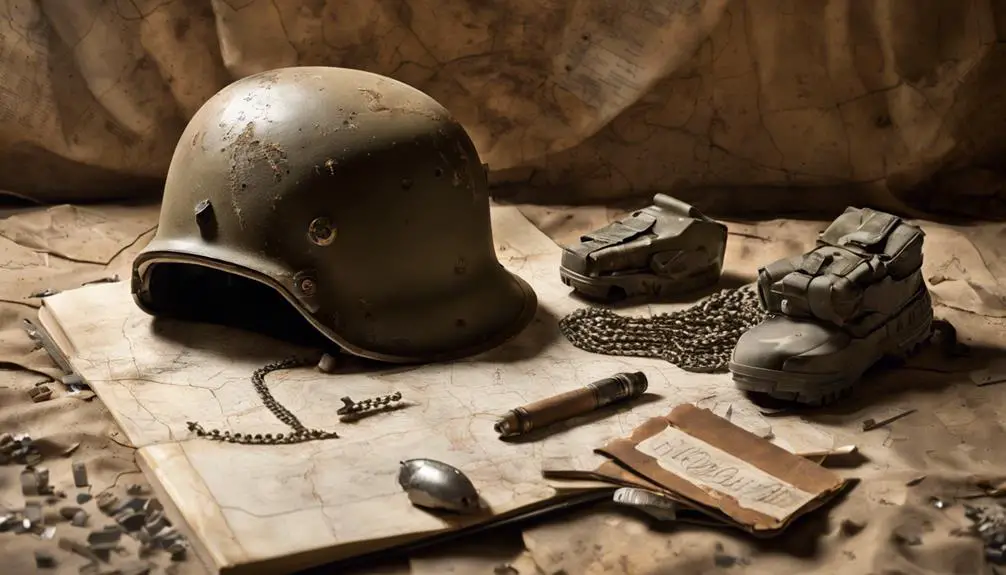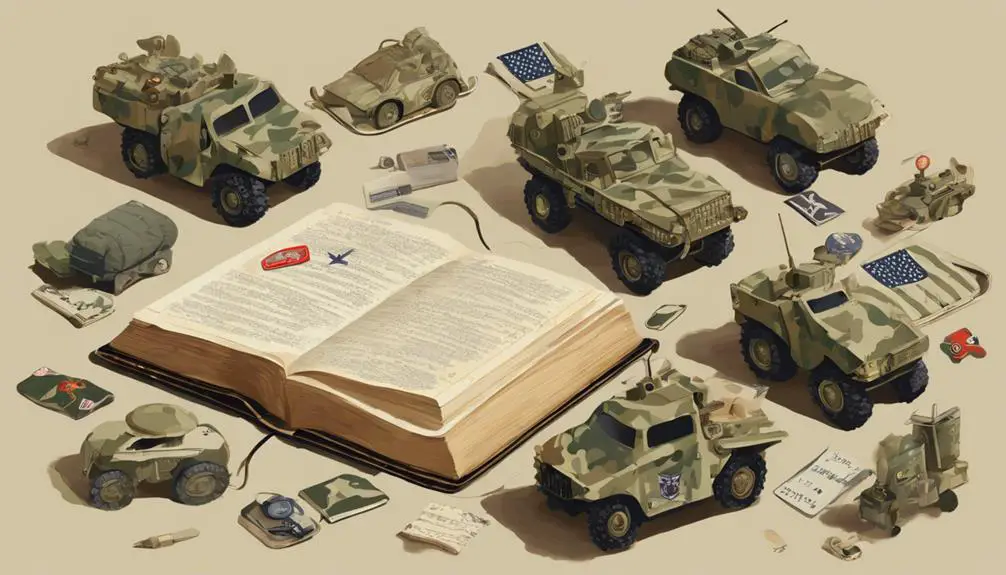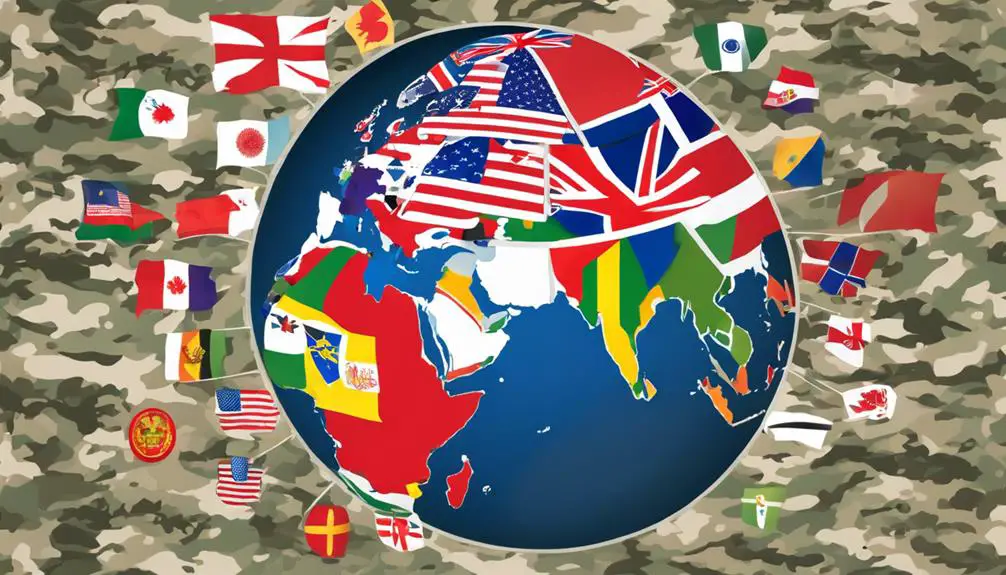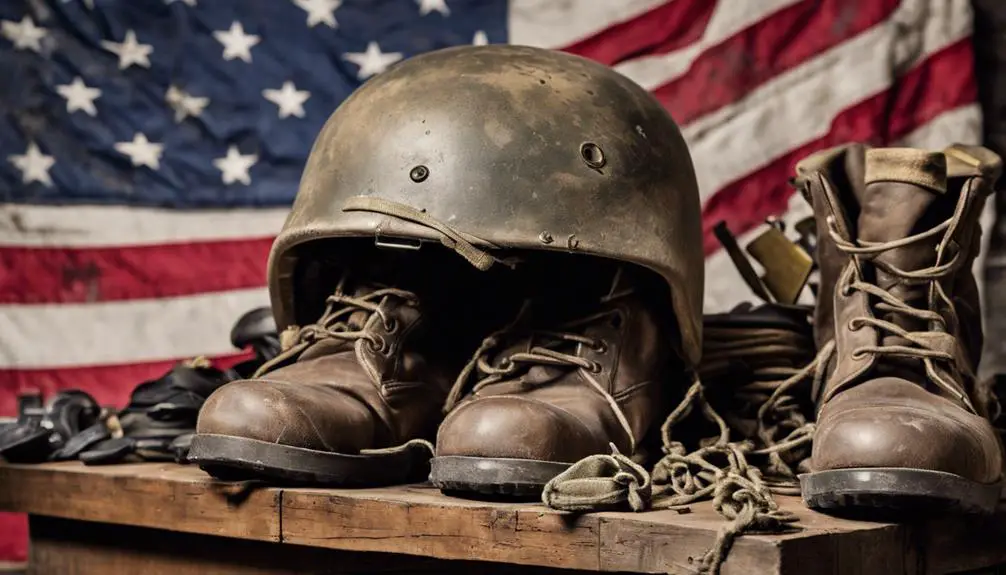You're about to explore the world of military slang, where phrases like 'Hooah' and 'Oscar Mike' are more than just catchy sayings – they're essential communication tools that facilitate clear and efficient exchange of information on the battlefield. You'll discover how combat banter boosts morale, and how troops use witty remarks and humorous anecdotes to relieve tension. From newbie terms like 'FNG' to operational lingo like 'SITREP', you'll uncover the evolution of military slang and its importance in high-pressure situations. As you explore further, you'll uncover the unique cultural influences shaping military communication.
Slang From the Front Lines

As you deploy to a combat zone, you'll quickly realize that military slang is an essential part of the frontline lexicon, allowing troops to swiftly communicate complex ideas in high-stress situations.
Combat banter, a unique form of communication, is used to boost morale and relieve tension. You'll often hear troops exchanging witty remarks, sarcastic comments, and humorous anecdotes to cope with the pressures of war.
War stories, often embellished and entertaining, serve as a way to bond with fellow soldiers and share experiences. These verbal exchanges help build camaraderie, trust, and a sense of belonging among troops.
In the heat of battle, clear communication is vital, and military slang facilitates this process. You'll find that phrases like 'Hooah' (meaning 'yes' or 'agreed') and 'Oscar Mike' (meaning 'on the move') become an integral part of your vocabulary.
Terms for New Recruits
You'll quickly pick up on terms like 'FNG' (freaking new guy) or 'boot' when referring to yourself or fellow new recruits, as these colloquialisms become an integral part of your military vocabulary.
As a new recruit, you'll experience the infamous Boot Camp Blues – the grueling training period that pushes you to your limits. It's during this time that you'll participate in Rookie Rituals, like getting your first haircut or receiving your first uniform. You might feel overwhelmed, but don't worry, it's all part of the initiation process.
Your drill instructors will test your limits, but it's all designed to prepare you for the challenges ahead. You'll learn to navigate the military's unique culture, and before long, you'll be tossing around slang like a pro.
Military Acronyms Decoded

Military jargon is full of acronyms, and mastering them is essential to successfully maneuvering the complex world of military communications, where a single misinterpreted abbreviation can have significant consequences. You'll need to learn these abbreviations to effectively communicate with your team and avoid misunderstandings.
Understanding the origins and evolution of acronyms is vital. Here are a few examples:
- SITREP: Short for Situation Report, this acronym originated in the military to provide a concise update on a situation.
- FOB: Forward Operating Base, which evolved from the need for temporary bases during military operations.
- MRE: Meal, Ready-to-Eat, which replaced the earlier C-Ration.
- EOD: Explosive Ordnance Disposal, a critical unit responsible for bomb disposal.
Acronyms are a fundamental part of military communication, and grasping their meanings will help you navigate the complex world of military language. By understanding the origins and evolution of these abbreviations, you'll become more proficient in military jargon and improve your communication skills.
Operational Lingo Explained
In the fast-paced world of military operations, understanding operational lingo is crucial to ensuring seamless communication and effective execution of missions. You need to be able to decipher the tactical jargon and lingo evolution to stay ahead of the game.
Here's a breakdown of some key operational lingo:
| Term | Meaning | Example |
|---|---|---|
| Sitrep | Situation Report | 'Provide a sitrep every 30 minutes during the op.' |
| AO | Area of Operations | 'Our AO is the eastern sector of the city.' |
| COMMS | Communications | 'Check your COMMS gear before we move out.' |
| EOD | Explosive Ordnance Disposal | 'Call in EOD to defuse the IED.' |
As you navigate the world of military operations, understanding these terms will help you stay on the same page as your team. Remember, clear communication is key to success in high-pressure situations. By mastering operational lingo, you'll be better equipped to execute missions efficiently and effectively.
International Military Slang

As you move beyond operational lingo, you'll encounter a broader vocabulary of international military slang that reflects the diverse cultural influences and historical contexts of global militaries. This slang often emerges from cultural exchange and coalition operations, where military personnel from different countries work together and adopt each other's phrases and idioms.
Here are a few examples of international military slang:
- Scran: A British military term for food, which has been adopted by some international coalition forces.
- Schnitzel: A German term for a military exercise or simulation, used by NATO forces.
- Madrassa: An Arabic term for a military training camp, used by some Middle Eastern forces.
- Kumusta: A Filipino term for 'how are you?', used by US and Filipino forces in joint operations.
International military slang is a fascinating reflection of the global nature of modern military operations. As you engage with military personnel from different countries, you'll encounter a rich tapestry of slang that reveals the cultural exchange and coalition operations that underpin global security efforts.
Frequently Asked Questions
What Is the Origin of the Term "Grunt" for Infantrymen?
You're wondering where the term 'grunt' for infantrymen comes from.
During the Vietnam Era, you'd hear it thrown around in Boot Camp, but its origins are murky.
One theory is that it refers to the sound an exhausted soldier makes while lugging heavy gear.
Another theory suggests it's a nod to the infantry's 'ground-pounding' work.
Whatever the reason, 'grunt' has become an iconic term for those on the front lines.
Is Military Slang Only Used in the US Military?
You might think military slang is a uniquely American phenomenon, but you'd be surprised. As you explore the world of international adaptations, you'll find that military slang transcends borders.
It's not just a US military thing; other countries have their own versions, reflecting their unique cultural nuances.
The cross-cultural significance of military slang lies in its ability to create a sense of camaraderie among soldiers worldwide, fostering a shared identity that goes beyond national boundaries.
How Does Military Slang Affect Communication Among Troops?
You might think military slang is just a fun way to talk, but it plays an essential role in communication among troops.
When you use slang, you're signaling that you're part of the team, building camaraderie and trust. It's a form of code switching, where you adapt your language to fit in with your unit.
This shared language helps you communicate quickly and efficiently, especially in high-stress situations. It's not just about sounding cool – it's about being understood and working together seamlessly.
Are Military Slang Terms Universally Understood Across Ranks?
As you navigate the military ranks, you might wonder if military slang terms are universally understood across ranks. The answer is, not quite.
While some terms are widely recognized, others are specific to certain branches or units. You'll find that rank variance and cross-branch differences can lead to misunderstandings.
For instance, a term like 'hooah' might be familiar to Army personnel, but less so to Navy sailors.
Can Military Slang Be Used in Formal Military Communications?
When you're communicating formally in the military, you'll typically stick to official jargon. However, there are formal exceptions where military slang can be used.
In official reports or briefings, you'll rarely see slang terms, but in situation reports (SITREPs) or operational orders, colloquialisms might be used to convey critical information quickly.
Conclusion
You've made it through the trenches of military slang! Remember, 'knowledge is power,' and now you've got the power to decode the lingo from the front lines. Whether you're a new recruit or a seasoned vet, this glossary has got you covered.
From acronyms to international slang, you're now equipped to navigate the complex world of military communication. Stay sharp, and stay informed – in the world of military slang, knowledge is truly power.







